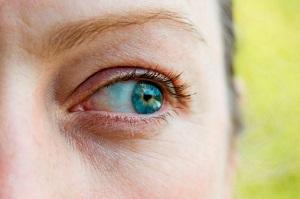Hypervigilance
 Hypervigilance is an increased state of vigilance and awareness that may be caused by fear and anxiety, as well as certain mental health conditions. People experiencing hypervigilance typically exhibit symptoms in an attempt to avoid danger.
Hypervigilance is an increased state of vigilance and awareness that may be caused by fear and anxiety, as well as certain mental health conditions. People experiencing hypervigilance typically exhibit symptoms in an attempt to avoid danger.
Symptoms of Hypervigilance
Hypervigilance is not a diagnosis in itself, but can be symptomatic of some mental health conditions. It may manifest in slightly different ways in different people, but common outward signs include:
- An increased startle reflex—a person may jump in response to sudden noises or surprises.
- Dilated pupils, an increased heart rate, and elevated blood pressure.
- Obsessive avoidance of perceived threats, along with increased scanning for threats. For example, a person might constantly monitor people around him/her to see if they have guns.
- Overestimation of a situation’s threatening nature. For example, the person scanning the environment for guns may think he/she sees people with guns even when they are holding something innocuous such as a pen.
Causes of Hypervigilance
Severe anxiety and stress can cause brief periods of hypervigilance. Hypervigilance is the body’s way of protecting people from threatening situations, so people in dangerous environments—such as those fighting in the military—may experience prolonged periods of hypervigilance. Hypervigilance is also common in children who have recently experienced a trauma such as the death of a parent or who have witnessed violence. The symptom is characteristic of posttraumatic stress disorder. People with PTSD tend to suffer from chronic hypervigilance that may trigger panic attacks and flashbacks. Other anxiety disorders such as generalized anxiety disorder can also cause hypervigilance. Some other mental health conditions, particularly paranoid schizophrenia, may cause periods of hypervigilance.
Treatment for Hypervigilance
Relaxation techniques, medication, and psychotherapy can all help people to reduce their hypervigilance. When hypervigilance is the result of a threatening environment—such as ongoing domestic violence—the first step in treatment should be to help the person get out of the dangerous environment.
Reference:
Colman, A. M. (2006). Oxford dictionary of psychology. New York, NY: Oxford University Press.
Last Updated: 08-7-2015
- 16 comments
- Leave a Comment
Carleen
August 23rd, 2016 at 1:32 PMVery good. Like to hear more about treatment . Like what kind of group therapy, medications help best, under dr care. ? And meditation?
Jay
September 19th, 2016 at 9:31 AMHello ,I liked the article very much ,the information is very helpful, I have been suffering with this for long time … and would like to know what other alternative medications available to treat hyper vigilance, is marijuana a possibility?
for Miss Dona Snow
December 3rd, 2016 at 6:50 AMJay, of the September 19, Dona says, “yes,” and she has been suffering from personal, and very severe post traumatic stress since she was 5. In a state not yet….welcoming…? of pot (or, something,) she may be bold to say that, in combination with her prescriptive medication, Xanax, marijuana is a top opportunity in target of (@…?) hypervigilance, in that, the sensitivity becomes less hard – set and radically defined, more socially thoughtful and accepting (but becomes obsessive for use…) and that she had experienced a sense of “peaceful knowing” inside her own self. I am hod. I am an advocate for a variety of….people deserving far better in life. This last year, starting April….the sixteenth or seventeenth….Dona had a ischemic stroke, and this has, since, been a terrible process of days. I am here, as loyal as I can be in guidance, to offer and give, anew, a truly good thing. Dona believes adamantly, that marajuana and it’s derivatives ought to be accepted worldwide, without question or hindrance. I don’t disagree, and I, like many ought to (my vision [s.] say) stand up tall. I’ll let my limbs sway and dance in the breezes…..drink plenty of water…..and enjoy the view.
Leave a Comment
By commenting you acknowledge acceptance of GoodTherapy.org's Terms and Conditions of Use.
